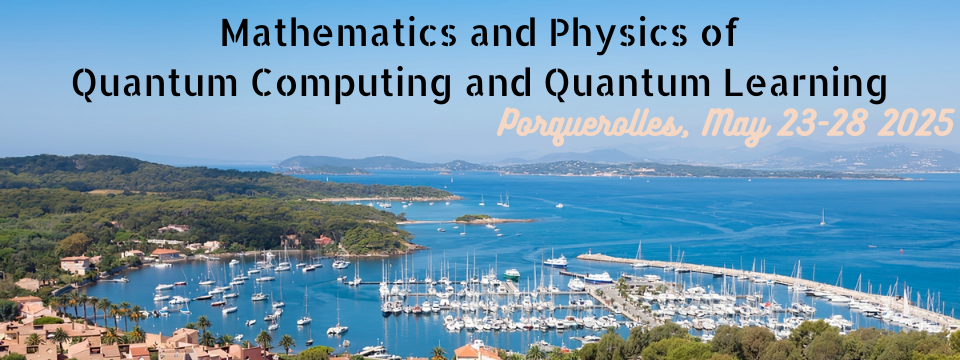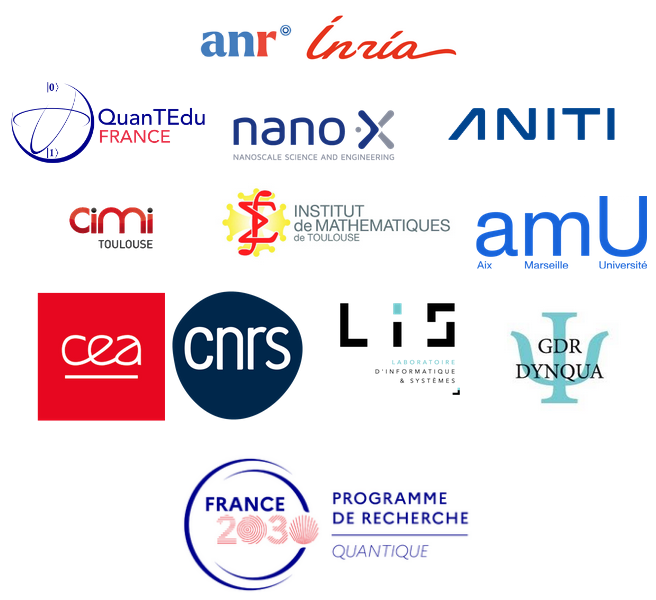|
|
|
ABOUT THE SCHOOL
This summer school aims at gathering mathematicians, computer scientists, and physicts interested in quantum learning and quantum computation.
The lectures will start on Saturday May 24th in the morning, and will end on Wednesday May 28th at noon. Participants are expected to arrive on Friday May 23rd in the afternoon and depart on Wednesday May 28th in the afternoon.
Several introductory lectures will be given by leading researchers in the field. The topics covered include: quantum computing and information, quantum learning theory, tensor networks, quantum states of neural networks, quantum cellular automata. The lectures shall be complemented by additional, more focused, research talks. Young researchers as well as confirmed researchers are welcome to participate. Poster sessions for Phd and post-doctoral students will be organized during the school.
Ample time for discussion and exchanges will be set aside, allowing for an interactive and inclusive in-person event.
VENUE
The school is going to be held on-site, at the IGESA (Institution de gestion sociale des armées) center, on the island of Porquerolles, France, during the periond 23-28 May 2025. Note that Thursday, May 29th, is a national holiday in France.
REGISTRATION AND FEES
Please register until April 30th 2025. Note that the number of places is limited, so please register as soon as possible.
>>> REGISTRATION FORM <<<
Once your registration will be accepted by the organizing team, you will receive a link to the payment website. Only participants that have payed the fees will have their registration validated and admitted to the event. All participants will be responsible for organizing their own travel to the conference.
The conference fees, which cover local expenses (full board accommodation), are as follows:
- Masters and PhD students, postdocs: 450 EUR
- Faculty and industry participants: 600 EUR
Unfortunately, we cannot offer any form of financial support to participants.
LECTURES
In this introductory course, we will focus on understanding the quantum nature of information, through the multiple theorems that characterize it. We will illustrate them with applications in quantum communications and quantum simulation.
Time-allowing a subset of the following points will be presented:
- postulates, no-cloning, no-distinguishability;
- density matrices and quantum operations;
- Dirac and Coecke notations;
- superdense-coding protocols, teleportation, QRAC, BB84,...;
- non-signalling vs. locality, Bell inequalities, certified randomness;
- state decomposition theorems and operators;
- digital quantum simulation by quantum walks and quantum cellular automata.
Hamiltonians play a central role in quantum physics because they describe how closed quantum systems evolve over time. Therefore, characterizing an unknown Hamiltonian – or at least determining some of its properties – when given access to the corresponding time evolution, or to copies of the Gibbs state describing a thermalized system, is a task of fundamental interest. Additionally, with early quantum devices emerging, it becomes a technologically relevant task, with implications for benchmarking in quantum simulation and quantum computing. In these quantum learning theory lectures, I will provide an introduction to the vibrant research area of Hamiltonian learning and testing, with a focus on recent work proving rigorous learning and testing guarantees.
In this series of lectures, I will introduce tensor networks, use the tensor network formalism to present fundamental concepts in quantum computing, and present fundamental tensor networks algorithms illustrated by applications in quantum simulations and machine learning.
Tensor networks provide an intuitive diagrammatic language to describe and reason about complex operations on tensors. In this set of lectures, I will first introduce tensor networks and revisit classical identities in matrix algebra through their lens (e.g., Sylvester Equation, relations between traces and norms, etc.) as well as use them to present fundamental concepts in quantum computing (density matrices, entanglement entropy, partial traces, etc.). We will then dive in more depth in fundamental algorithms for performing efficient operations with tensor networks (focusing mainly on Matrix Product States, but not only), optimizing tensor networks (gradient descent, DMRG), decomposing tensors, as well as sampling and performing efficient inference operations on distributions parameterized as tensor networks (e.g. marginalization). Lastly, I will present applications of tensor networks in quantum computing and machine learning.
This abstract outlines three lectures on the intersection of quantum computing and natural language processing (QNLP), focusing on the DisCoCirc framework for scalable compositional models.
The first lecture introduces DisCoCirc, a novel approach that builds on the mathematical foundation of DisCoCat, which describes how words interact in a sentence to produce meaning. While DisCoCat fixed word meanings as states, DisCoCirc allows word meanings to evolve within a system. Sentences are represented as gates within a quantum circuit, updating the meanings of words. The compositional structure uses string diagrams to represent information flow, and the meaning of an entire text emerges as a single diagram. This framework provides a more dynamic and scalable way to represent and process language.
The second lecture explores how the quantum-inspired nature of DisCoCirc allows it to model more complex linguistic structures by enabling sentences to interact within texts, rather than being limited to isolated sentence-level meanings. It emphasizes how these advancements can lead to interpretable models of language, moving away from traditional black-box approaches.
The final lecture presents experimental results with the QDisCoCirc model for question answering. It demonstrates the model’s ability to generalize compositionally, maintaining accuracy when tested on larger datasets, and compares its performance with classical models such as transformers and LSTMs. The lecture concludes with a discussion of future directions for compositional quantum NLP, highlighting the benefits of quantum computation for this approach.
The analysis of quantum correlations lies at the heart of various results in quantum information theory, quantum foundations and quantum computation. In this lecture, we will introduce some of the main mathematical tools to understand quantum correlations and see how to exploit this understanding for applications. Starting from the well-known Bell's theorem, we will introduce nonlocal games and ways to establish their classical and quantum values. We will further introduce the notion of self-testing and some of its applications. Finally, if there is time, we will discuss the multipartite setting and techniques to analyse correlations in networks, what new opportunities they bring and also their limitations.
RESEARCH TALKS
- Adam Bílek (VSB - Technical University of Ostrava) - Sequentially-parallel quantum networks for discrimination
One of the promising approaches to the certification of quantum operations in the Noisy Intermediate-Scale Quantum (NISQ) era is quantum channel discrimination. In this task, an unknown channel is applied multiple times to a carefully prepared input state, followed by processing and final measurement in order to determine its identity. By optimizing these factors, discrimination protocols can distinguish between different channels with minimal error. In this talk, we will focus on multiple-shot discrimination of unitary channels. Three types of discrimination schemes will be considered: the parallel scheme, which utilizes an entangled initial state shared across all channel uses and no processing; the sequential scheme, where we apply a sequence of successive applications of the channels on the same system, allowing intermediate processing between them. Due to limitations of current NISQ architectures, such protocols are not practical as decoherence affects sequential protocols, while imperfect implementation of two-qubit gates impacts parallel schemes. For this purpose, we will introduce sequentially-parallel schemes with a rectangular structure that combine features of both approaches. Each protocol is analyzed theoretically, and their performance in a noisy setting is validated through rigorous benchmarking on IBM's quantum hardware. Our results highlight critical considerations in the design and implementation of quantum circuits for NISQ-era devices and offer insights into the limitations of current quantum technology for channel discrimination tasks.
- Lara Janiurek (University of Strathclyde) - A Coined Quantum walk with Decoherence for simulating partial differential Equations
We propose a framework for simulating partial differential equations (PDEs) using discrete-time quantum walks , inspired by structural parallels with the lattice Boltzmann method. Our model introduces controlled decoherence in the coin space to interpolate between ballistic and diffusive regimes. In the small-lattice-spacing limit, we may recover advection-diffusion dynamics, with tunable transport coefficients linked to coin parameters and decoherence rates. In nonlinear encoding regimes, where observables are mapped from the quantum state nonlinearly, we obtain first-order PDEs exhibiting self-advection and anisotropic diffusion, structurally reminiscent of simplified hydrodynamic models. The approach uses shallow quantum circuits and constant-depth updates, suggesting a path toward efficient quantum implementations of certain continuum dynamics.
- Jan Kochanowski (LTCI, Télécom Paris) - Complexity of computing mixed Schatten norms of quantum maps
We show that computing mixed Schatten q->p norms of linear maps between matrix spaces is generically NP-complete. When restricting to quantum channels, i.e. CP maps, it becomes efficiently doable only in the hypercontractive q<=p setting. Astonishingly we also show that even computing the 1->p norm of an entanglement-breaking CPTP map or the (1->1)-norm of a difference of entanglement breaking channels is an NP complete problem. In contrast, we show that computing the mixed completely bounded (CB) q->p norm is easy in the aforementioned cases where the non cb is NP-hard. So from a computational complexity perspective the mixed cb norm problem in the above cases behaves like the classical mixed matrix norm problem, where known. Further we give an explicit algorithm to compute the cb and non cb mixed norm of a CP map in the hyper contractive regime and compare to the classical setting.
- Mehrad Sahebi (EPFL) - On Dequantization of Supervised Quantum Machine Learning via Random Fourier Features
In the quest for quantum advantage, a central question is under what conditions can classical algorithms achieve a performance comparable to quantum algorithms—a concept known as dequantization. Random Fourier features (RFFs) have demonstrated potential for dequantizing certain quantum neural networks (QNNs) applied to regression tasks, but their applicability to other learning problems and architectures remained unexplored. In this work, we derive bounds on the generalization performance gap between classical RFF models and quantum models for both regression and classification tasks with both QNN and quantum kernel architectures. We support our findings with numerical experiments that illustrate the practical dequantization of existing quantum kernel-based methods. Our findings not only broaden the applicability of RFF-dequantization but also enhance the understanding of potential quantum advantages in practical machine-learning tasks.
ORGANIZERS
- Giuseppe Di Molfetta (Aix-Marseille University)
- Hachem Kadri (Aix-Marseille University)
- Ion Nechita (CNRS, Toulouse University)
- Clément Pellegrini (Toulouse University)
CONTACT
To contact the organizers, send an email to mpqcql2025@sciencesconf.org
SPONSORS



